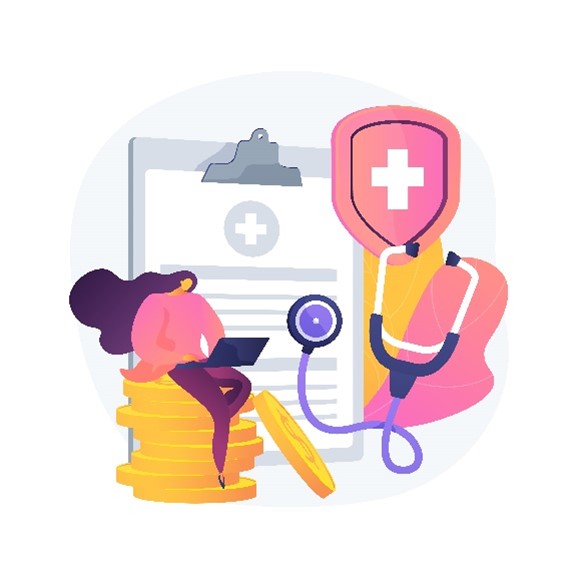The medical debt industry has observed an upward trajectory, especially in the US, for the past couple of years, with reports suggesting that around 14 million people owe a debt of over $1000. With the recent wave of inflation and the economic instability that has seemingly impacted the whole world, healthcare service providers have encountered increasing medical debt collection challenges daily.

When it comes to efficient medical debt collection, healthcare service providers must overcome healthcare billing obstacles while catering to the needs of their consumers to ensure an optimized debt collection experience through debt recovery solutions. These challenges can range from human and technical errors in billings to insurance delays and denials, communication barriers, and much more that, if not addressed on a timely basis, could severely impact healthcare service providers’ cash flows.
Inaccurate Billings
In a standard debt collection procedure with optimized debt recovery solutions, the healthcare service providers send the unpaid invoice to the insurance company or the customer. One of the medical debt collection challenges that could arise is the inaccuracy and errors in the billings.
With some reports suggesting that up to 80% of all medical bills contain errors, the need to properly assess the billings along with multiple verifications has come to a rise in the case of medical debt collection challenges. Whether the mistakes are due to a human error or a technical error, inaccurate billings would cause the patients to pay more or less of the required amount, along with multiple claim disputes and delays in debt recovery solutions.
Once the errors have been sighted, the problem as part of the medical debt collection challenges hereafter lies in the legitimacy of the debt itself, as the patients will have a hard time trusting the validity of the amount owned. Such errors can also create a negative perception amongst the consumers, which could devalue the debt recovery solutions and tarnish the healthcare service provider’s reputation, leading to more cashflow issues and healthcare billing obstacles.
Solution
For healthcare institutions to truly foster positive bonds with their patients based on trust and authenticity and provide optimized debt recovery solutions, one of the ways to overcome medical debt collection challenges related to incorrect billings is to utilize tech-powered solutions for efficient collection.
The world is moving towards advanced technological solutions such as automation and AI that can further enhance debt recovery solutions while mitigating the risk of uncollected invoices and bad debt when providing patient debt solutions.
Although automation and AI can optimize most of the manual tasks required to eradicate inaccurate billings, there still needs to be a verification procedure for the billings to overcome medical debt collection challenges, which can be done by prioritizing transparent billings that ensure efficient debt recovery solutions with regulation compliance. The element of human error could still occur when managing pending debt accounts, which is why, to tackle such medical debt collection challenges, healthcare service providers need to include practices such as verifying billing codes, reviewing patient portals, regular billing audits, and billing monitoring.
Insurance Delays and Denials
After a patient receives the required services, healthcare service providers send the billings to the insurance company. In an ideal scenario, the insurance company would clear the billings, communicate with the healthcare institutions, and clear the debt. Yet, the insurance company delaying or denying the billings could result in a dire situation for the debt recovery solutions and multiple medical debt collection challenges.
From the insurance company’s perspective, the insurance could get delayed or denied due to several reasons, such as lack of documentation, authorization issues, or even billing errors, which can result in an ongoing list of medical debt collection challenges. Whatever the case, if the insurance gets delayed, there’s still a chance for the debt recovery to go smoothly. Still, the customer must appeal and further communicate with the insurance companies in case of insurance denial. All these things result in the healthcare service providers spending more time and resources monitoring and tracking the situation without getting any results from their debt recovery solutions. Not only this, but the delayed debt recovery in the case of patient debt solutions can also disrupt the cash flow of healthcare institutions, leading to more medical debt collection challenges.
Solution
Providers are to contact the insurance company throughout the process. Proper workflow communication can help resolve medical debt collection challenges, from sending the initial invoices to dealing with delays and appeals.
Maintaining proper documents and records with timely submissions can help deal with delays and solve medical debt collection challenges from insurance companies. The longer the debt remains uncollected, the harder it gets to clear it and provide the patient with the necessary debt recovery solutions. For enhanced efficiency and transparent billings, accurate billing codes and electronic health records (EHR) can further optimize the process to facilitate healthcare service providers.
Another aspect of dealing with healthcare billing obstacles is verifying the insurance coverage to ensure that all parties involved are on the same page as part of the debt recovery solutions. Automated workflows, real-time verification, regular follow-ups, and much more are vital healthcare practices that must be implemented to deal with medical debt collection challenges and mitigate the risk of bad debt due to insurance delays and denials.
Expensive Healthcare
Healthcare services have been notoriously expensive in the last couple of years, with reports suggesting that health spending will reach up to $6 million by 2027. Amidst such inflated prices, it can get complicated for patients and service providers to properly carry out the debt recovery process when tackling medical debt collection challenges.

Due to the increasing expenses of healthcare services, it is becoming more difficult for patients to keep up with such costs. This results in further medical debt collection challenges, delays in debt repayment, and ineffective debt recovery solutions, leading to more healthcare billing obstacles. Due to such delays, healthcare service providers must expend more resources to keep up with the patients in hopes of recovering the total debt due.
Speaking of the total debt due to expensive healthcare services, it is becoming increasingly difficult for patients to clear such large amounts simultaneously. Therefore, the debt collectors, according to the available debt recovery solutions, have to receive the debt in smaller quantities, further delaying the process and the existing medical debt collection challenges.
Solution
Expensive healthcare services have hit the world by storm, with 41% of adults having medical debt. Therefore, cooperative approaches with patients are vital to managing medical debt collection challenges. By providing flexible payment plans, negotiable terms to the patients, and user-centric debt recovery solutions, the healthcare service providers will not only see a rise in the pace of debts being collected, but such actions will also instill trust and confidence in the patients.
Situation Sensitivity
Maintaining medical debt and overcoming medical billing issues is never easy for patients. In such situations, implementing debt recovery solutions for medical debt collection challenges may seem insensitive if not done correctly. With the added stress and possible financial hardship, it becomes difficult for healthcare service providers to ensure optimal recovery without damaging patient relations.
Once the patients have received their medical services, healthcare service institutions must start their debt recovery after a specific notice period. If the situation’s sensitivity is not considered during patient debt solutions, the problem could take a turn for the worse, resulting in deteriorated relations and further delays in medical debt collection challenges.
Solution
To effectively tackle medical debt collection challenges related to the situation sensitivity, the debt collectors must engage the case with cordial collection approaches and empathetic debt recovery solutions. By thoroughly communicating with the patient and understanding their reasoning for delayed payments, the probability of patients complying with the patient debt solutions increases, which in turn helps healthcare institutions deal with medical debt collection challenges.
No Insurance
Health insurance can play a vital role in managing medical debt collection challenges, as it usually deals with unpaid amounts in most circumstances. However, not everyone has health insurance for multiple reasons, including cost, eligibility, awareness, etc.
As reports suggest, around 30 million people in the US have been uninsured for the past couple of years. This makes things difficult not only for the patient but also for healthcare service providers. As if the responsibility of the whole medical debt falls on the shoulders of the patients, the probability of the service providers having to deal with bad debt and medical debt collection challenges severely increases. Healthcare institutions would also have to increase the amount of resources spent to collect debt along with debt recovery solutions as the patient may not be aware of all the terms and conditions without the help of an insurance company.
Solution
Many healthcare service providers have charity and assistance programs for patients to help them cover their costs. Such programs help healthcare institutions by letting them manage the medical debt collection challenges to ensure that patients without insurance can also pay off their debts in a reasonable time frame. Moreover, flexible payment plans could be viable debt recovery solutions for medical debt collection challenges.
Regulation Compliance
One of the challenges that medical debt collectors face when it comes to healthcare debt recovery is regulatory non-compliance.
Authorized entities have established many regulations to ensure the safety and security of patient debt solutions. In the case of medical debt collection, these regulations oversee several factors as part of the debt recovery solutions and communications between all parties to handle challenges such as debt recovery practices, ethical codes, consumer rights, and much more. The consequences of violating such regulations include legal actions, regulation fines, reputational damage, and even revocation of healthcare licenses.
Some of the regulations included in medical debt recovery include:
- Fair Debt Collection Practices Act (FDCPA
- Health Insurance Portability and Accountability Act (HIPAA)
- Consumer Financial Protection Bureau (CFPB) Regulations
- No Surprises Act
- Fair Credit Reporting Act (FCRA)
Solution
To mitigate the risk of any regulation violation and ensure optimized debt recovery solutions, it is essential to implement compliance programs in healthcare practices to effectively deal with medical debt collection challenges. Such programs can help the institutions take proactive actions in case of medical debt collection challenges, such as incorporating essential cyber security measures, conducting regular audits, training the staff with required regulation protocols, etc. Also, proper monitoring and reporting of debt recovery approaches can help healthcare providers ensure that all such practices comply with the regulations. Regulatory Technology (Reg Tech) has also made regulation compliance much less hectic, especially for healthcare institutions looking to deal with medical debt collection challenges through efficient debt recovery solutions.
Strategies for Overcoming Medical Debt Collection Challenges
Healthcare institutions worldwide prioritize effective debt collection strategies that can facilitate overcoming medical billing issues without making detrimental compromises. That being said, to optimize your patient debt solutions, here are a few practices you should try implementing:
Transparent Billings And Audits
Regular audits with transparent billings are a great way to manage medical debt collection challenges. These help healthcare institutions maintain proper records regarding unpaid patient invoices and are also beneficial in case of claim disputes, as they can be handled proactively by implementing transparent billings through optimal debt recovery solutions.
Transparent billing fosters positive relationships with customers to deal with medical debt collection challenges. It ensures timely payments, which helps improve internal processes and plays a vital role in detecting fraud and ensuring accuracy.
Regular Communication
Although having an effective communication strategy seems like a no-brainer when dealing with medical debt collection challenges, if done correctly, it can have positive, long-lasting effects.
With so many entities involved, the probability of miscommunications between them remains a healthcare billing obstacle. Clear and regular communication could include reporting medical charges, managing disputes, providing debt recovery solutions, etc. Such efforts can also lead to timely intervention when facing medical debt collection challenges to avoid further delays throughout the workflow.
Insurance Verification
To avoid any insurance delays or denials when dealing with medical debt collection challenges, the healthcare service provider could verify the insurance presented by the patients when the services are delivered.
Such verification saves time and ensures transparent billings with the patient while mitigating any surprise costs.
Outsource Third Party Collection Agencies
Instead of expanding resources to tackle medical debt collection challenges, many healthcare service providers have shifted towards outsourcing medical debt collection agencies.
Such agencies have the required expertise and experience in the relevant field, which makes them prime candidates for managing medical debt collection challenges. Additionally, debt collection agencies have better resources and more reach that can enhance the debt collection experience and provide proactive debt recovery solutions for medical debt collection challenges.
How Cedar Financial Can Solve Your Medical Debt Collection Challenges
Since 1991, Cedar Financial has prioritized managing medical debt collection challenges and facilitating patients and healthcare service providers worldwide, with a global reach of over 150 countries. With industry-leading services and efficient debt recovery solutions such as multichannel communication, insurance follow-ups, custom-tailored payment solutions, regulation compliance, and much more, Cedar Financial exceeds expectations in providing patient debt solutions.
$1.9 Million Pharmaceutical Settlement in Egypt: Cedar Financial used its local debt collection agents in Egypt as part of its industry-leading debt recovery solutions to ensure that a distributor cleared its unpaid invoices to a global pharmaceutical company for its products, leading to a recovery of $1.9 Million.
2-Year-Old Medical Insurance Dispute Resolved: Cedar Financial managed to resolve a dispute between an insurance company and a hospital by staying patient and fostering positive relations, ultimately leading to the recovery of a 2-year-old dispute in months.
Contact Cedar Financial today to start managing your medical debt collection challenges with efficient debt recovery solutions. 1.9M Pharmaceutical Settlement in Egypt.










